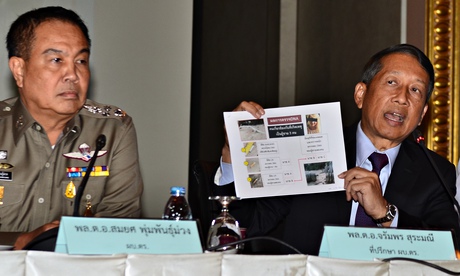- The Guardian,

Two Burmese men accused of murdering two British backpackers in Thailand have alleged that they were beaten by police in order to extract confessions.
Thai police officers threatened the two suspects with electrocution during a violent interrogation before the pair agreed to admit to killing Hannah Witheridge and David Miller, according to a Burmese embassy lawyer who spoke to the men on Tuesday.
Aung Myo Thant told Burmese media that one of the suspects, Win Zaw Htun, 21, was beaten by police and an interpreter after initially refusing to admit the murders. “He didn’t confess when he was in the investigation centre,” Aung Myo Thant told the Burmese newspaper Irrawaddy.
“A police officer hit the side of his face and the interpreter also hit him four times. Then police threatened to electrocute [the suspects] and said that no worse thing would happen to them if they confessed. So they finally confessed as they saw no hope.”
The allegations come after three other Burmese migrant workers said they had been assaulted and scalded with boiling water during a police interrogation. Photographic evidence of their alleged abuse, seen by the Guardian, has been passed to the British ambassador to Thailand, Mark Kent, as calls grow for an independent inquiry.
Thai police announced last week that Zaw Lin and Win Zaw Htun, both 21, had confessed to murdering Witheridge, 23, and Miller, 24, on a beach on the island of Koh Tao on 15 September.
According to an account of their confessions given by Thai police, the suspects encountered the British backpackers embracing on the beach in the early hours of the morning. They are then said to have bludgeoned Miller and left him to drown in the surf before raping and killing Witheridge.
Andy Hall, the international affairs adviser of the Burmese Migrant Worker Rights Network, called for an urgent investigation into the abuse allegations, which have been denied by Thai police.
He told the Guardian: “Allegations of physical or any other kind of abuse, intimidation or pressure by law enforcement officials or those working alongside such officials during a criminal investigation process – whether inflicted on those formally detained and accused of a crime or simply against those suspected of a crime – are serious violations of human rights and should have urgently and independently been investigated.”
A team of migrant rights activists has been dispatched to the island of Koh Samui to meet the two murder suspects, who are being held in prison before a court appearance on Wednesday.
A third Burmese man is being held in custody as a witness.
Hall, a British human rights activist based in Thailand, said: “We have undertaken this mission as a number of serious allegations of physical abuse against Myanmar workers as part of the questioning process in this murder case have been raised to us in the past week or so.”
Testimony seen by the Guardian indicates that the other three Burmese workers were accosted by police on 27 September while they played takoh (cane ball) on Koh Tao. After being hauled in for questioning, it is alleged they were beaten by police and scalded with boiling water. The men, who work on the island, were then released.
The abuse allegations were emphatically denied by Thai police at a press conference in Bangkok.
Police colonel Prachum Ruangthong said he had met with Burmese embassy officials – who had received complaints of police misconduct – and discussed with them the allegations of false evidence and torture. “They were satisfied with our explanations,” Prachum said.
The police also fought back against accusations that the Burmese suspects were little more than scapegoats for possibly higher-profile culprits – a theory suggested by various human rights groups, migrant rights activists and media outlets.
Police said investigators relied on witness testimony, CCTV evidence and DNA tests – particularly evidence taken from cigarettes found at the crime scene – to come to their conclusions and that their investigation was by the book.
“It’s impossible to create scapegoats in 2014, since it is easier for police to be grilled by the public,” Prachum was quoted as saying by the Bangkok Post.
Court proceedings against the murder suspects are expected to begin on Wednesday on the nearby island of Surin. The head of the investigation, Major General Paween Pongsirin, told the online news portal Phuketwan that the case was now “ready to proceed” after “some error[s]” occurred in the first few days of the investigation. “Wednesday’s hearing will give the various interested parties the opportunity to hear for themselves what we have learned,” he said.
A Foreign Office spokesman said: “We are concerned about the reports of allegations of mistreatment and expect these to be dealt with appropriately. The investigation and judicial process remains a matter for the Thai authorities, but we expect it to be conducted in a fair and transparent way. We remain in contact with them and have asked that they provide updates to the British Embassy in Bangkok and the Foreign and Commonwealth Office in London.”
http://www.theguardian.com/world/2014/oct/07/suspects-britons-murder-thailand-police-brutality

Comments